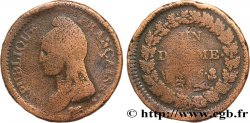v19_1167 - Essai de monnaie de Muller 1795 Hennin701 p. 484 et pl. 70
MONNAIES 19 (2004)
Starting price : 380.00 €
Estimate : 650.00 €
Realised price : 453.00 €
Number of bids : 3
Maximum bid : 453.00 €
Starting price : 380.00 €
Estimate : 650.00 €
Realised price : 453.00 €
Number of bids : 3
Maximum bid : 453.00 €
Type : Essai de monnaie de Muller
Date: 1795
Metal : billon
Millesimal fineness : 500 ‰
Diameter : 25,5 mm
Orientation dies : 12 h.
Weight : 4,95 g.
Edge : cannelée
Rarity : R2
Coments on the condition:
Très belle frappe avec une jolie patine aux reflets marrons et noirs. Exemplaire superbe qui semble en argent plutôt qu’en billon, avec une bonne partie de son brillant
Catalogue references :
Obverse
Obverse legend : FORCE A - LA LOI.
Obverse description : Hercule, debout, tenant de la main droite un bouclier placé au-dessus d’un autel, et sur lequel est représenté le bonnet de la Liberté : de la main gauche il s’appuie sur la massue ; à l’exergue : Vasselon.
Reverse
Reverse description : En cinq lignes dans le champ : NOUVEAU/ METAIL A SIX/ DENIERS DE FIN./ COMPOSITION DU/ C. MULLER..








 Report a mistake
Report a mistake Print the page
Print the page Share my selection
Share my selection Ask a question
Ask a question Consign / sell
Consign / sell
 Full data
Full data









